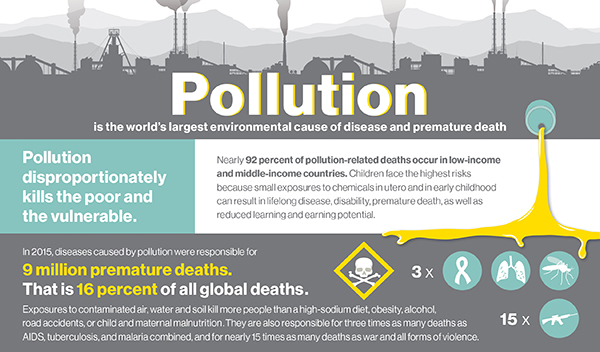Catholic systems are among the green leaders
By NANCY FRAZIER O'BRIEN
A report on global progress against climate change published online Oct. 30 in the prestigious medical journal The Lancet calls climate change "the greatest global health opportunity of the 21st century." The product of an ongoing collaboration between 24 academic institutions and intergovernmental organizations from every continent, the report underscores that efforts to address global warming can benefit human health.

Infographic © 2017 Mount Sinai Health System
"The Lancet Countdown on health and climate change: from 25 years of inaction to a global transformation for public health" hammers home what is at stake: "The impacts of climate change are disproportionately affecting the health of vulnerable populations and people in low-income and middle-income countries," the authors wrote. "By undermining the social and environmental determinants that underpin good health, climate change exacerbates social, economic and demographic inequalities, with the impacts eventually felt by all populations."
While discernable progress has been made in the past five years, urgent and substantial climate change mitigation efforts are needed to protect human health, the authors said. The impacts of climate change "are projected to worsen with time, and current levels of adaptation will become insufficient in the future," the authors noted.
They added though that "the potential benefits and opportunities are enormous, including cleaning the air of polluted cities, delivering more nutritious diets, ensuring energy, food, and water security, and alleviating poverty and social and economic inequalities."
The authors said the global reaction to the U.S. decision to exit the Paris Agreement has affirmed there is "clear political will and ambition to reach the treaty's targets." The Paris Agreement sets out an international action plan to move countries the world over to low-carbon economies.
The report said the voices of health professionals are essential in driving continuing progress and ensuring that health benefits are derived from efforts to mitigate pollution.
Catholic health systems long have demonstrated a commitment to "green" practices by raising the issue of climate change with national and local leaders and with the public in the communities that the health systems serve and by putting conservation practices into place that reduce the carbon footprints of their hospitals.
"I think the first and most important thing is to continue to remind our elected officials that this is important to us," said Laura Krausa, system director of advocacy for Englewood, Colo.-based Catholic Health Initiatives, which has 101 hospitals and operates in 18 states. "We also need to help the general public understand how it is already having an impact."
Ascension, a St. Louis-based nonprofit health system with 141 hospitals in 22 states and the District of Columbia, took up one aspect of the challenge to contain global warming in 2008 when it accepted the U.S. Department of Energy's Better Buildings Challenge to reduce energy use in its acute-care hospitals by 20 percent by 2020.

Sechrist
Lois Sechrist, environmental stewardship program lead for Ascension, said that between July 1, 2008, and the end of 2016, the health system "reduced energy use by 22 percent since its baseline year, avoided $53.3 million in cost and reduced over 1,114,600 tons of carbon dioxide emission."
The system achieved those savings, Sechrist said, "by conducting energy audits, commissioning, and retro-commissioning projects; upgrading building automation systems; installing variable-speed drives on mechanical equipment; retrofitting lighting systems to LED; installing heat pump chiller heaters; installing boiler heat recovery systems; and improving building systems as part of infrastructure renewal."
Sechrist also praised Seton Healthcare Family, a ministry of Ascension Texas, for its commitment to reduce drive-alone commutes to work by 20 percent. "In addition, Ascension ministries sponsor bike-share programs, install electric vehicle charging stations, fund public transportation passes and provide on-site shuttle buses in order to reduce climate impact directly related to transportation," she said.

Krausa
Krausa said CHI's "green team" helps the system's facilities "implement recycling, be smarter about purchasing so there's less waste, practice green health and understand best practices" to "make everybody in our organization as successful as they can possibly be." But that is not always easy with hospitals in both very urban and very rural areas, she said, adding that some are so remote they don't have recycling available.
Laura Anderko holds the Robert and Kathleen Scanlon Chair in Values Based Health Care in the nursing school at Georgetown University in Washington. She said hospitals are "second in their carbon footprint only to coal plants" but many are "looking at alternative energy sources and other ways to reduce their footprint and become more sustainable." Those steps often have the additional benefits of saving money and improving the health of both employees and patients, she said.
Anderko, who helped CHA produce a book on climate and health and serves on the board of Health Care Without Harm, said the effects of Hurricane Harvey on the Houston area last year showed the progress that health systems have made in anticipating and responding to natural disasters caused by climate change.
There were many fewer patients at risk in Houston as a result of Hurricane Harvey as compared with Hurricane Katrina's deadly impact in New Orleans in 2005, she said. "There were some success stories with Hurricane Sandy (which struck New York and New Jersey in 2012) because some hospitals had prepared, but not all."
Health systems "are much more aware of their role in emergency preparedness," Anderko added. "Before there was just a government response."
She said hospitals also play a part in fighting climate change in their local communities and on a global level with efforts to localize the food economy, improve access to safe food and water and ensure the preservation of adequate green spaces around their own buildings and elsewhere.
Pope Francis' 2015 encyclical on the environment, "Laudato Si," provides the rationale for Catholic social teaching on the issue, Anderko said.
"There is a wonderful marriage, if you will, between what the pope said and the work of Catholic hospitals," she said. "Amongst all the noise, the encyclical helps provide a core center for the world to reflect on."
CHI's Krausa reiterated the crucial role that Catholic health systems have in raising the climate change issue to the world's leadership.
"I don't think health care has had as big a voice (on this issue) as it has now, but more is needed," she said. "We are trusted in our communities, and it's all about health. It's a little different than if the message is coming from a politically charged nonprofit."
Copyright © 2018 by the Catholic Health Association
of the United States
For reprint permission, contact Betty Crosby or call (314) 253-3490.